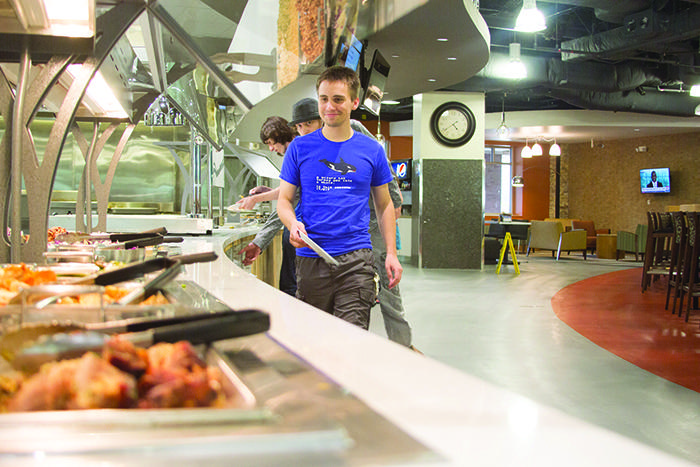
Photo by Jorja Smith – Multimedia Editor
By Matt Ketcham – [email protected] – Contributor | Sept. 3, 2014 |
A multi-million dollar refurbishment with new designs, food options and seating, the recently completed Brown Hall sparks questions about sustainability and student input.
“Our students are very, very interested in local, organic, vegan and vegetarian options. We have a very demanding population for the size that we are,” said Emily Williams, senior director of Dining Services.
Brown Hall renovations began as part of negotiations to renew Chartwells as the campus’ dining vendor, among several other dining services companies who submitted bids. As a part of this request for proposal process, Dining Services pursued improvements to the on-campus dining experience they felt were necessary.
Among their primary goals were renovations to the dining hall, which was outdated and needed many things replaced, such as the dishwasher and double-decker ovens, Williams said.
Splitting the cost with Chartwells became increasingly important due to costs of the renovations. The price tag included $100-150,000 for a new energy-efficient dishwasher and more than $15,000 per double-decker oven. To secure a new contract with the campus, Chartwells agreed to contribute $10 million during the next 10 years towards on-campus dining renovations.
To help shape the goals and implementation of dining services renovations, UNC Asheville collaborated with the Dining Services Committee as well as the Dining Services Student Advisory Group. The former committee informed the RFP and vendor selection and included two students, while the latter worked with the design and functionality of the new space throughout the process.
Despite the challenge of delivering a variety of selection to a small campus, UNCA made strides in sustainable food, participating in the Real Food Challenge and recently named the fourth-most vegan-friendly small college in the nation.
Chartwells’ commitment also included more modest changes to several on-campus retail locations. Of the $4.7 million allocated from the Chartwells’ fund, $3 million was used in the Brown Hall renovation, with the remaining $1.7 million used for improvements to Highsmith Student Union, Argo Tea, the Wellness Café and The Down Under.
A strong portion of the usage of these retail outlets is through retail meal equivalencies, an aspect of the on-campus meal plans which allow students access to retail areas as part of their meal plan cost.
Students noticed a cutback in meal equivalencies, with the maximum allowed down from 10 to five. These equivalencies originally were not included in new meal plans during the initial contract agreement between UNCA and Chartwells.
“Dining services went into conversations with Chartwells and (they) graciously agreed to bring them back in a limited number,” Williams said.
Williams also said Dining Services hopes the expansion and renovation of Brown Hall offsets the cutback in meal equivalencies.
“We want people to be more engaged in Brown Hall. With the 100 new seats, we feel it’s more able to accommodate the student body,” Williams said.
This increased reliance on the dining hall may be a driving force behind students’ main complaint.
“It lacks a bit of flow and I’ve found it a bit confusing,” said Daisy Torres, a resident junior.
Another common sentiment of students regards the improvement of the food itself.
“The food is pretty much the same and less available, especially meat selection,” said Charlie White, a sophomore senator with the student government association, who worked to collect and respond to student feedback throughout the dining renovations process.


















